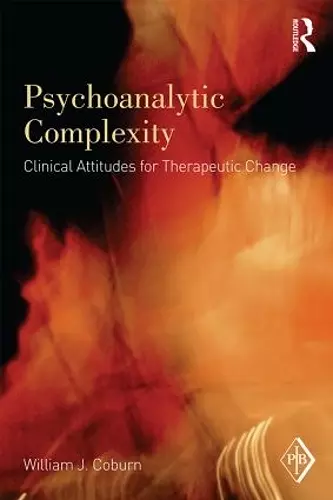Psychoanalytic Complexity
Clinical Attitudes for Therapeutic Change
Format:Paperback
Publisher:Taylor & Francis Ltd
Published:21st Dec '13
Currently unavailable, and unfortunately no date known when it will be back
This paperback is available in another edition too:
- Hardback£165.00(9780415896238)

Psychoanalytic Complexity is the application of a multidisciplinary, explanatory theory to clinical psychoanalysis and psychotherapy. It carries with it incisive and pivotal attitudes that aim to transform our understanding of therapeutic action and the change process. Here, William Coburn offers a revolutionary and far-reaching counterpoint to the remnants of Cartesianism and scientism, respecting and encouraging human anomaly rather than pathologizing or obliterating the uniqueness of the individual person.
In Psychoanaltyic Complexity, William Coburn explores the value of complexity theory previously understood as an explanatory framework with which clinicians can better understand, retrospectively, therapeutic action and the change process. He further extends this sensibility by examining the ways in which such a rich theoretical framework can inform what clinicians can do, prospectively, to effect positive change within the therapeutic relationship. He persuasively argues that the medium of bringing to light new ways of relating, emotional experiencing, and meaning making resides in the fundamental attitudes derived from a complexity theory sensibility as applied to psychoanalysis and psychotherapy.
Using a variety of clinical illustrations throughout, Psychoanalytic Complexity is a radical corrective to reductionism and the more traditional presumption that the problem lies with the patient and the cure lies with the therapist. It offers a new language, vocabulary, way of thinking, and a new way of being with others that are pivotal in arriving at affirmative therapeutic change. This book is intended for psychoanalysts, clinical psychologists, therapists, mental health counsellors, academics and teachers who are interested in new trends in psychoanalysis and psychotherapy.
"William Coburn’s Psychoanalytic Complexity is a stunning contribution to the development of a new, post-Cartesian conceptual language for psychoanalysis, one that decisively parts company with the doctrine of the isolated, individual mind. Instead, human experience is understood as forever embedded in and constituted by complex intersubjective contexts and systems. The language of complexity theory is rich, evocative, and varied, and to follow Coburn’s ideas is to be opened up to new ways of thinking about all the fundamental issues of psychoanalytic theory and psychotherapy. This work will be indispensable to all students and scholars who are interested in the most creative transformations that are occurring in our field." - George Atwood, Professor of Psychology (Emeritus), Rutgers University
"This book will change your practice for the better! Coburn guides us through the non-linear dynamic systems theories with grace and clarity, offering a set of working principles that capture what we actually do and feel every day. These concepts have often seemed obscure, but here they come alive: Coburn speaks to the reader right away, and stays there with clinical illustrations, lucid conceptualizations and careful scholarship. Offering an approach that gets beyond the usual psychoanalytic shibboleths, he has taken the application of complexity theory to psychotherapy to the next level. This is the place to start if you want to know why these new models matter for clinical work." - Stephen Seligman, DMH, Clinical Professor of Psychiatry, Infant-Parent Program, University of California, San Francisco
ISBN: 9780415896245
Dimensions: unknown
Weight: 204g
118 pages